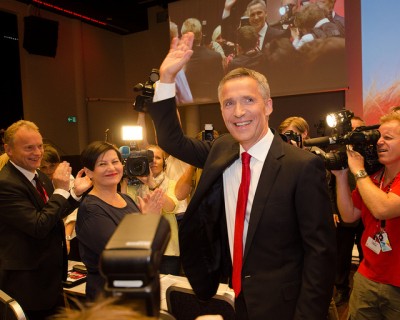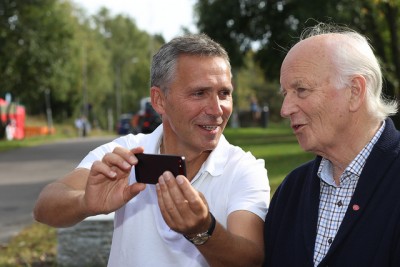He won’t formally take over until October 1, but Norway’s former prime minister, Jens Stoltenberg, was already reported to be on a flight to Washington on Sunday to prepare himself for his new job as secretary general of NATO, the world’s largest military alliance. The preparations have been going on for months already.

Stoltenberg officially stepped down on Saturday as leader of Norway’s Labour Party and head of the opposition parties in Parliament, clearing the way for his close colleague and successor, Jonas Gahr Støre to take over. After weeks of media hype and an emotional extraordinary meeting of the party, the so-called “Stoltenberg era” of Norwegian politics came to a close.
It was characterized by seemingly endless accolades, hugs, tears and laughter as Stoltenberg made the rounds of television studios and radio programs, posed for cameras while riding a bicycle to work, cooperated with a string of lengthy profile articles in local newspapers and met over strawberries and cream with the Norwegian press corps. It was all part of a fond farewell to a lifetime in Norwegian politics, as he gets ready to move to Brussels and an entirely new form of politics involving many powerful countries at NATO headquarters.

It helped to get a good hug from his father, Thorvald Stoltenberg, himself a Labour Party veteran who has served as Norway’s defense minister, foreign minister and substitute prime minister during Gro Harlem Brundtland’s governments. It was the senior Stoltenberg who convinced his son to go along with the proposal lodged by German Chancellor Angela Merkel and endorsed by US President Barack Obama that he become NATO’s secretary general. Jens was reluctant to leave his widowed 82-year-old father, but told newspaper Dagens Næringsliv (DN) over the weekend that Thorvald was crystal-clear that he had to take the job.
“Yeah, and I’ll tell you why I was in favour of this,” the elder Stoltenberg told DN while Jens prepared one of their traditional Thursday night dinners at his father’s Oslo home. “The last time I took on a diplomatic posting, my father was 96 years old, and of course you think you want to be close to your father and mother during the last years of their lives. But I also believed I had to follow my life. And I believe Jens and Ingrid must do the same.”

Jens Stoltenberg’s wife, Ingrid Schulerud, already spends a lot of time in Brussels in her own top diplomatic job for Norway’s foreign ministry. Stoltenberg told DN that she had made it clear she didn’t want him to take on the job as prime minister again and had wanted, finally, a “calmer life” with Jens more often at home. When the pressure was on Jens earlier this year whether to answer Merkel’s and Obama’s call NATO duty, her approval was critical.
It’s not clear exactly how enthusiastic Schulerud was over the prospect of a new life with security guards, chauffeur-driven cars and high-level politics, and she’s widely expected to keep her foreign ministry post, but he won her approval on a Tuesday night in early February, when the White House was pressuring Norway’s foreign ministry for an answer. French President Francois Hollande was expected in Washington for a state visit and Obama, Jens was told, wanted to secure Hollande’s support for Stoltenberg as NATO chief, too. He ultimately got it, after what foreign ministry sources told DN was a round of “French vanity:” Stoltenberg had to make a quick trip to Paris for a “job interview” with Hollande, at which he was told that the French wanted him to work hard for the tightest possible cooperation between NATO and the EU, and that Hollande was glad Stoltenberg said he wanted to learn French.
Polished his CV
That’s only one of the things Stoltenberg may or may not need to study in the months ahead. His qualifications reportedly were stressed in a critical meeting of EU ambassadors earlier this year, who noted his many years as prime minister, his ability to hold a coalition government together for eight years, his leadership of a nation in shock and sorrow after a lone terrorist’s attack on Norway three years ago, his personal support for the EU and his good relations with Russian leaders that led to the historic treaty that settled territorial issues between Norway and Russia in the Barents Sea. DN reported that Norwegian officials had discreetly polished Stoltenberg’s CV during the campaign for the NATO job, by noting that his government had boosted defense budgets and played an active role in NATO operations, such as those in Afghanistan and Libya.
One of his first jobs as NATO boss will be to encourage defense boosts in member countries as well, such as those already being made in Poland, Latvia, Lithuania, Romania and the Czech Republic, backed by prospects of support from the US and Canada. “Both Obama and (US defense chief Chuck) Hagel have stressed very clearly that they expect that Europe will invest more in its own security,” Norwegian Defense Minister Ine Eriksen Søreide, who played a key role in supporting Stoltenberg’s appointment, told newspaper Aftenposten last week. The tense situation with Russia, following its military intervention in Ukraine and annexation of Crimea, hangs over all NATO and EU operations at present.
Building his staff
Meanwhile, Stoltenberg already has assembled a preliminary staff and temporary work quarters in the currently unused official residence of Norway’s defense chief at Akershus Fortress. It includes four interim advisers on defense and foreign policy issues. Stoltenberg has been careful not to interfere with or supercede outgoing NATO boss Anders Fogh Rasmussen but has been visiting Brussels, had “private” meetings with Rasmussen and seen the lavish, high-security home where he’ll live. He’s hired Norway’s current ambassador to NATO, Vegard Ellefsen, to be his chief of staff in Brussels. Other top positions will also be filled between now and the autumn, with speculation in Norway running high over whether Stoltenberg will tap other Norwegians for top NATO jobs.
There’s one thing Stoltenberg admits he’ll need to get used to, and that’s a much higher level of formality at NATO. Stoltenberg is informal by nature and likes to joke, not least with journalists. “I’ll have to be very careful about making jokes,” he told reporters on Friday, “at least in the beginning.”
newsinenglish.no/Nina Berglund

